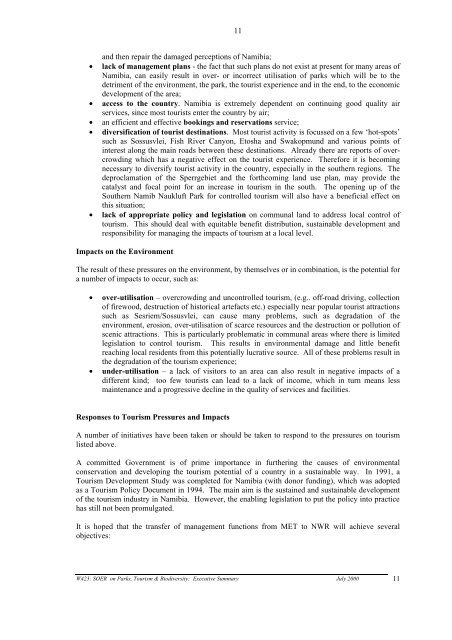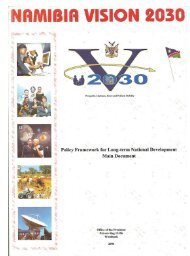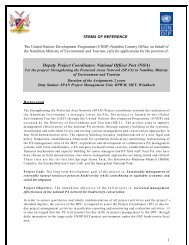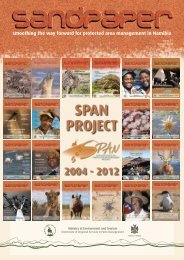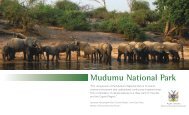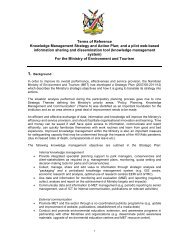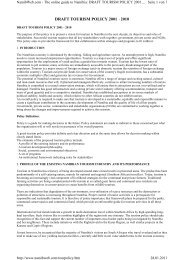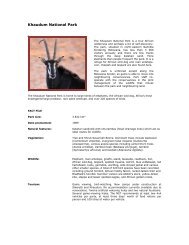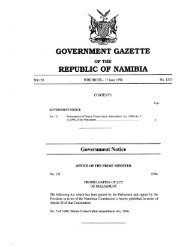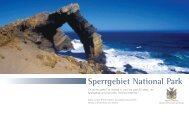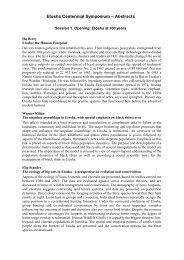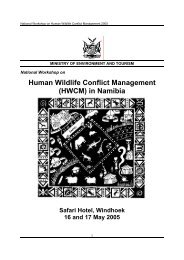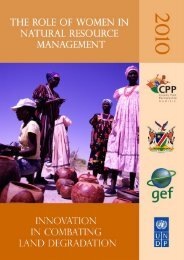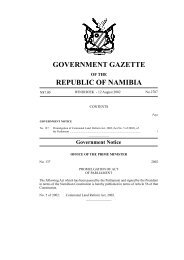EXECUTIVE SUMMARY - Ministry of Environment and Tourism
EXECUTIVE SUMMARY - Ministry of Environment and Tourism
EXECUTIVE SUMMARY - Ministry of Environment and Tourism
You also want an ePaper? Increase the reach of your titles
YUMPU automatically turns print PDFs into web optimized ePapers that Google loves.
11<br />
<strong>and</strong> then repair the damaged perceptions <strong>of</strong> Namibia;<br />
• lack <strong>of</strong> management plans - the fact that such plans do not exist at present for many areas <strong>of</strong><br />
Namibia, can easily result in over- or incorrect utilisation <strong>of</strong> parks which will be to the<br />
detriment <strong>of</strong> the environment, the park, the tourist experience <strong>and</strong> in the end, to the economic<br />
development <strong>of</strong> the area;<br />
• access to the country. Namibia is extremely dependent on continuing good quality air<br />
services, since most tourists enter the country by air;<br />
• an efficient <strong>and</strong> effective bookings <strong>and</strong> reservations service;<br />
• diversification <strong>of</strong> tourist destinations. Most tourist activity is focussed on a few ‘hot-spots’<br />
such as Sossusvlei, Fish River Canyon, Etosha <strong>and</strong> Swakopmund <strong>and</strong> various points <strong>of</strong><br />
interest along the main roads between these destinations. Already there are reports <strong>of</strong> overcrowding<br />
which has a negative effect on the tourist experience. Therefore it is becoming<br />
necessary to diversify tourist activity in the country, especially in the southern regions. The<br />
deproclamation <strong>of</strong> the Sperrgebiet <strong>and</strong> the forthcoming l<strong>and</strong> use plan, may provide the<br />
catalyst <strong>and</strong> focal point for an increase in tourism in the south. The opening up <strong>of</strong> the<br />
Southern Namib Naukluft Park for controlled tourism will also have a beneficial effect on<br />
this situation;<br />
• lack <strong>of</strong> appropriate policy <strong>and</strong> legislation on communal l<strong>and</strong> to address local control <strong>of</strong><br />
tourism. This should deal with equitable benefit distribution, sustainable development <strong>and</strong><br />
responsibility for managing the impacts <strong>of</strong> tourism at a local level.<br />
Impacts on the <strong>Environment</strong><br />
The result <strong>of</strong> these pressures on the environment, by themselves or in combination, is the potential for<br />
a number <strong>of</strong> impacts to occur, such as:<br />
• over-utilisation – overcrowding <strong>and</strong> uncontrolled tourism, (e.g.. <strong>of</strong>f-road driving, collection<br />
<strong>of</strong> firewood, destruction <strong>of</strong> historical artefacts etc.) especially near popular tourist attractions<br />
such as Sesriem/Sossusvlei, can cause many problems, such as degradation <strong>of</strong> the<br />
environment, erosion, over-utilisation <strong>of</strong> scarce resources <strong>and</strong> the destruction or pollution <strong>of</strong><br />
scenic attractions. This is particularly problematic in communal areas where there is limited<br />
legislation to control tourism. This results in environmental damage <strong>and</strong> little benefit<br />
reaching local residents from this potentially lucrative source. All <strong>of</strong> these problems result in<br />
the degradation <strong>of</strong> the tourism experience;<br />
• under-utilisation – a lack <strong>of</strong> visitors to an area can also result in negative impacts <strong>of</strong> a<br />
different kind; too few tourists can lead to a lack <strong>of</strong> income, which in turn means less<br />
maintenance <strong>and</strong> a progressive decline in the quality <strong>of</strong> services <strong>and</strong> facilities.<br />
Responses to <strong>Tourism</strong> Pressures <strong>and</strong> Impacts<br />
A number <strong>of</strong> initiatives have been taken or should be taken to respond to the pressures on tourism<br />
listed above.<br />
A committed Government is <strong>of</strong> prime importance in furthering the causes <strong>of</strong> environmental<br />
conservation <strong>and</strong> developing the tourism potential <strong>of</strong> a country in a sustainable way. In 1991, a<br />
<strong>Tourism</strong> Development Study was completed for Namibia (with donor funding), which was adopted<br />
as a <strong>Tourism</strong> Policy Document in 1994. The main aim is the sustained <strong>and</strong> sustainable development<br />
<strong>of</strong> the tourism industry in Namibia. However, the enabling legislation to put the policy into practice<br />
has still not been promulgated.<br />
It is hoped that the transfer <strong>of</strong> management functions from MET to NWR will achieve several<br />
objectives:<br />
W423: SOER on Parks, <strong>Tourism</strong> & Biodiversity: Executive Summary July 2000 11


